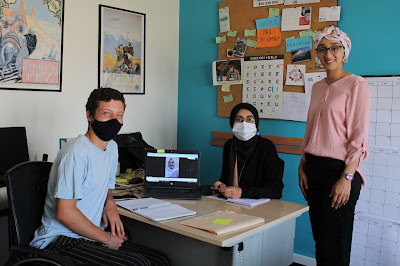The UN 2020 Water and Climate Change report provides a plethora of recommendations to prevent and alleviate the water-related effects of climate change, but a major barrier to actualizing these recommendations is financing. Water resources management is incredibly under financed. To meet only the first two targets of SDG 6 (ensure all have access to safe water, sanitation, and hygiene), capital investments must reach US$114 billion per year, which is triple current investments in this infrastructure. To finance the remaining four targets of SDG 6 – which include improving water quality, increasing treated wastewater, improving water efficiency, integrating water resources management, and protecting water-related ecosystems – would require even more capital investment than is currently available.
The report attributes this lack of financing largely to a ‘business as usual’ mindset, which ignores the risks of climate change and results in a failure to invest in water management. Relevant actors need to consider preventative action and evaluate the risk of not financing in water infrastructure.
Water management typically depends on traditional sources of financing from the government and development finance, but there are opportunities in climate finance. In 2016, only 2.6% of climate financing went to water management, despite water management benefits for other sectors.
The report points out two promising trends that may increase climate financing for water projects. First, the increased recognition of water projects’ mitigation potential. 93.8% of climate financing in 2016 went to mitigation, so water projects that also mitigate climate change can more likely access this funding. Second, climate finance is moving towards funding more adaptation measures. For example, the Green Climate Fund is aiming for 50% of its funds to go to mitigation measures and the remaining 50% go to adaptation measures.
Water projects requesting funding must make themselves appear bankable, or likely to receive funding. Bankable projects are those clearly linked to climate change impacts and are familiar and compliant with funding procedures. Projects that are considered bankable in climate finance explicitly address the causes and/or consequences of climate change. Adaptation projects in particular must also demonstrate their ability to withstand projected climate impacts in the area using scientific evidence. Finally, bankable projects are those that align with already existing policies such as a country’s National Adaptation Plan (per the Paris Agreement) or national development strategies.
Types of climate financing options
No-regret investments: These investments produce projects that are beneficial regardless of climate impacts, meaning there are gains made in the absence of climate change. Such projects include rainwater harvesting, sustainable groundwater management, improved water storage, wastewater reuse.
Low-regret investments: These investments offset climate risks at a cost, but the cost is small in comparison to benefits from avoiding future losses. Low-regret investments are usually adaptation and resilience-building projects that bring co-benefits to multiple sectors.
Results-based climate financing: These funds are dispersed once the project achieves pre-determined goals that have been independently verified. These funds typically go projects that improve things already in place like monitoring, reporting and verification capacity, strengthening domestic institutions, or mobilizing the private sector. Since carbon emissions are a well-defined indicator, most results-based investments have been made in climate mitigation projects.
The Green Climate Fund: Established as the financing mechanism for the Paris Agreement, the Green Climate Fund helps developing countries with projects to mitigate and adapt to climate change. Although the Fund’s goal was to have US$100 billion per year in pledges, it only had US$10.3 billion in 2019. Most of the Fund’s investment priorities involve water management.
The Global Environment Facility: The Facility, which acts as the financing mechanism for the UNFCCC, provides grants for environmental projects including but not limited to climate change mitigation and adaptation. Since 1992, it has funded around 1,000 mitigation projects and 330 adaptation projects.
The Adaptation Fund: Established under the Kyoto Protocol, the Fund finances projects that help developing countries adapt to climate change. Since 2010, it has supported 80 adaptation projects and committed $564 million to adaptation and resilience measures.
Development banks: Banks like the World Bank are increasingly prioritizing climate change in its investments. The World Bank has committed to providing US$200 billion in climate investments from 2021 to 2025. Alternatives to the World Bank are regional development banks that fund projects in their region. These regional development banks are increasingly committed to financing environmental projects.
Bilateral climate finance: Here, financing will come from one country for the benefit of another. This is seen with countries and regions like the EU, Switzerland, and the United Arab Emirates, as well as funds in developing regions like the Bangladesh Climate Change Trust Fund and the Green Fund in South Africa. Bilateral public climate financing has grown over the years from US$22.5 billion in 2013 to US$27 billion in 2018, with funds primarily financing mitigation projects.
National and subnational climate financing: Each country that has signed onto the Paris Agreement has nationally determined contributions that have spending plans for the government. Money allocated by the government on climate change projects may be used to fund water projects.
Private sector: The private sector made up 54% of climate financing in 2016, largely coming from project developers, carbon markets, foreign direct investment, insurance, and commercial financial institutions. Green bonds are an emerging source of financing in the private sector. Green bonds are climate bonds that offer “significant global opportunities to mobilize capital at scale for low carbon, climate resilient infrastructure and development efforts,” according to the World Bank.
Public-private partnerships: Although climate change is not very present in current public-private partnerships, efforts from the World Bank and the Public-Private Infrastructure Advisory Facility are introducing and normalizing climate financing.
Blended finance: Blended financing incorporates various sources of funding into one project or fund. By having multiple sources of funding, projects can look more attractive to traditional sources of capital.
Written by: Gari DeRamos, DSH's former intern











